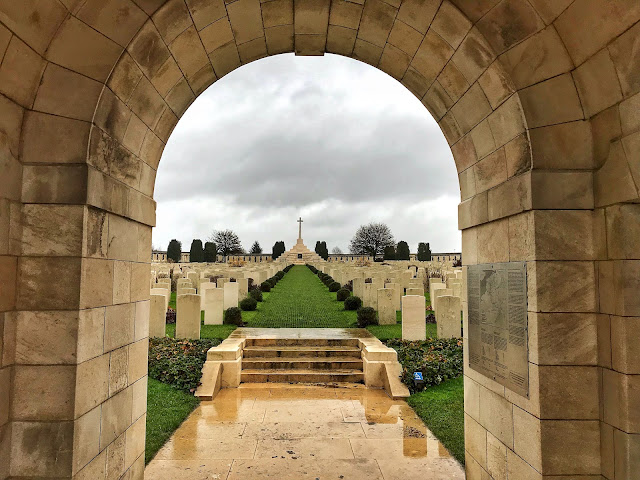The National Drink or National Sin? Temperance Campaigning in the First World War
In one of my very first blog posts about the Young Men's Christian Association (YMCA) during the First World War, I wrote on the row within the Association over the sale of alcohol within its recreation huts. The Association's General Secretary Sir Arthur Keysall Yapp won the disagreement, impressing his life's commitment to teetotalism onto his organisation.
For him, the matter was one of moral principle: intoxicants were a sin and should not be sold by a Christian charity that was committed to moral welfare and that sought to improve the lives of the men it served. The YMCA's huts would, instead, represent counter-attractions to the many bars and estaminets that sold cheap alcohol to soldiers on service. This also played into Yapp's presentation of the huts as 'Tommy's home' and the pub-like sale of alcohol was deemed to be in opposition to the domestic environment they wished to create.
In order to make its policy well-known, numerous articles about the sins of alcohol and comparative merits of temperance were published in the YMCA's weekly newspaper, some also re-published as standalone pamphlets for distribution within the huts. Talk of alcohol, if not its consumption, became almost an obsession for the Association throughout the war.
But the YMCA wasn't alone in its concern. It has been noted that the circumstances of the First World War led to a resurgence in Christian temperance campaigns, which had previously dominated public discourse in the 1880s. Henry Yeomans, in his analysis of late-nineteenth and early-twentieth century attitudes to alcohol, argued that while it had been 'a consistent and prolific source of public anxiety' for decades, the 'war intensified the need for tighter restrictions', leading to the resurgence.
This pressure even reached the government who established the Central Control Board (CCB) who investigated the medical dangers of alcohol and trialled methods to curb the nation's drinking. In one policy, they nationalised the pubs of Carlisle, where alongside the sale of alcohol they introduced 'new social facilities, such as billiard tables, newspapers and writing materials', much like the social counter-attractions offered in the YMCA's huts. The CCB is also well known for its introduction of licensing hours and the watering-down of beer as further methods to reduce national drunkenness.
Yet, for the YMCA and the temperance campaigners, this wasn't seen as enough. Largely from evangelical and Liberal backgrounds, these Christian agitators had long-campaigned for temperance on the grounds of its social benefits, which could increase overall efficiency and welfare. The war made these outcomes more pressing and it could now be argued that it was an issue of national importance that alcohol was restricted to help strengthen the nation and win the war. After all, no one could fight a battle or make munitions while intoxicated.
However, alcohol did also have a strong role to play in the nation's morale. Pubs were the social hubs of communities and for men on active service they could provide both a distraction from the war and comrade-building bonding opportunities. It is most likely for this reason that the government did not go further in its restriction of alcohol during the war, even when pressures against drink grew.
Instead, some of the most notable campaigns against alcohol were the pledge card campaigns to which people could promise they would abstain from intoxicants for the duration of the war. One of the largest was run by the Church of England, yet the YMCA also ran their own in which a soldier could 'promise by God's help to abstain from the use of all intoxicating liquors as beverages, and to do all that it can to promote the cause of temperance'. These were signed both by the abstaining soldier and a witness, sharing the commitment.
There are no impact studies or surviving statistics for these pledges, yet they can be seen to have caught the national attention at the time. Even the King, recognising the national mood, took the Church of England's pledge in April 1915. This was almost certainly pure propaganda, yet it was effective. The YMCA impolored soldiers to 'follow the King's example' and take the pledge, giving a real legitimation to their campaign.
Of course, while many did sign the pledge, there was nothing to stop them going on to drink and such campaigns definitely did not convince the majority of British people to give up alcohol. There were even infractions within the YMCA. Association worker the Rev. Wilton Rix complained in a letter to his wife upon his arrival in Egypt of the poor quality of whiskey available to him. Even more brazenly, at the Lille Gate YMCA in Ypres the 'eccentric' hut secretary Dr CJ Magrath was known to sell a 'Wipers cocktail' to soldiers. In recording this in his memoir, the regional secretary Barclay Baron merely remarked on its disgusting concoction of 'service ration rum and moat water', and not of the presence of prohibited alcohol.
It can therefore be seen that although there were regional deviations from the no alcohol rule, the YMCA did play a major role in the campaigns for temperance during the First World War, a moral mission, which contributed to the 'codification' of sobriety as a 'Christian virtue', such as was the level of Christian involvement in opposing intoxicants. And while national prohibition was never introduced as it later was in the USA, the campaigns were significant enough to have gained the backing of King George V during the First World War.
Kathryn
Sources:
The YM British Empire Weekly
Henry Yeomans, Alcohol and Moral Regulation: Public Attitudes, Spirited Measures and Victorian Hangovers, (Bristol: Policy Press, 2014).




No comments: